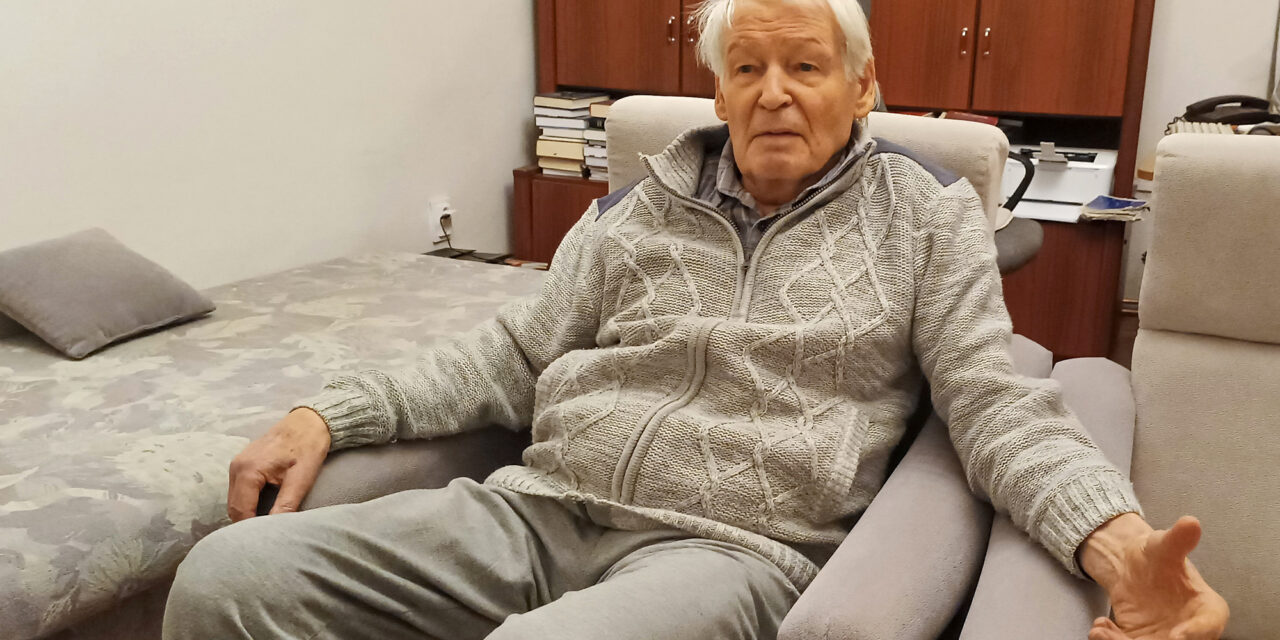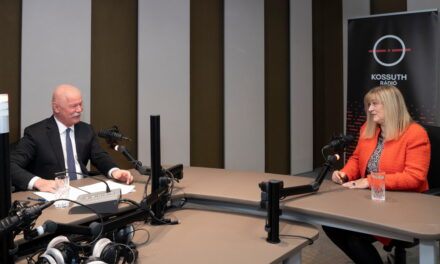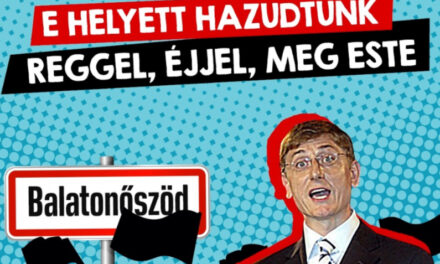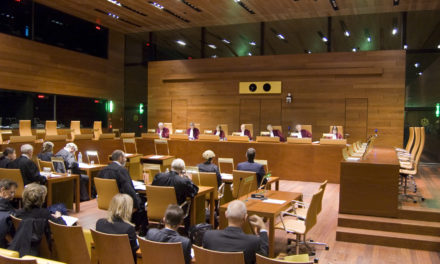Can someone be a loyal citizen of two nations at the same time? Can one love one's homeland and host country at the same time? Can a person born abroad feel the pain of the Hungarians? I would have answered no to the poetic question - but then I met Konrad Sutarski.
He is an agricultural engineer by qualification, who has won several awards with his inventions, while - or in spite of - he is a writer, poet, translator. An almost impossible duality.
"It's not." In Poland, I already dabbled in literary life, wrote poems and participated in the founding of the now legendary Wierzbak literary group in Poznań, which organized the first national poetry festivals in the history of Polish literature. I always had duality in me, that is, I worked in a real field, while also maintaining my interest in the humanities.
Before continuing the story, let's go back in time a little, to a defining, cruelly tragic moment of childhood, Katyn.
- My father served as a reserve officer during the war and when the Germans occupied the western part of Poland and the Russians the eastern part, the latter took him away. We waited for him to return home after the war, but we never saw him again. He became a victim of the Soviet carnage in Katyn, for which I could never forgive the communists. That is why I took part in the Poznań protests in 1956, although not with a weapon, but I was also there among the demonstrators against the regime. And when I heard about the Hungarian revolution, of course I enthusiastically supported those fighting against the communist power. I also wrote three poems in honor of the Hungarian revolution, of course in the "language of flowers" so that those who have ears to hear can understand it, but censorship can't get involved either.
However, this does not explain why he chose Hungary as his new homeland.
"There was a very prosaic reason for this." In 1960, a study trip brought me to this country, about which I knew very little at the time. I used to say that I came here as a "professional tourist", we visited agricultural machinery factories. The Creator wanted me to meet my wife on this road, because if this meeting had not happened, my life would probably be different. I came back because of him, and we got married in 1963. It's been 60 years! Well, we spent the first two years in Poland, but it turned out that my wife did not feel comfortable in a foreign environment, so we came back to Hungary. I got a job right away and several of my inventions won awards. It is true that I still knew very little Hungarian, but my colleagues welcomed me with such love and helped me so much that I quickly felt at home. It was also strange, but at the same time sympathetic, that while the Poles prefer to call each other "sir" and "ma'am", Hungarians usually say no to each other, which implies a more intimate relationship between people. Little by little, I got to know the country's history, and I realized that the Hungarians are an ancient nation that has had many glories and even more trials. There are many common and, of course, many different features and events between the two nations, so I slowly became half-Hungarian.
While he introduced the culture of his native country to us, and Hungarian to the Poles.
- After all, I am of Polish origin, so I always felt it was my duty, and I gladly undertook to represent my native country. After the change of regime in Hungary, I was the first director of the Polish Information and Cultural Institute, I worked as the first and three times elected president of the National Polish Minority Self-Government, we established the Museum and Archives of Polishness in Hungary, which then developed into a research center investigating 1,000-year-old Polish-Hungarian relations. In the beginning, I was the head of the institution, later its director, until my retirement in 2014. Not incidentally, I made films about Poland and reported on the events there for the then-founded Duna Television.
It was impossible for him to be half-Hungarian even in a simple spirit, since the Kádár regime took care to present the Poles as a kind of people who sell towels. This must have gone badly for a born Pole.
– It should be known that when this picture was painted of us, the situation in Poland was much worse than in Hungary. They struggled with a constant shortage of goods and were not wealthy, so they tried to live as best they could. I once traveled by train from Warsaw to Budapest and the man who was also on his way to Hungary tried to bring me over I don't even know what. Of course, the customs officers took what they found from him, I would have started to explain to him that such a thing does not reflect well on the Poles, and he objected that this was the only way he could provide his family with a little something. We were almost in Budapest when he took out something, I don't remember what, that the customs officers didn't find and asked me if I wanted to buy it from him. In vain, in a difficult situation, a person tries everything, but it was not his fault, but the system's fault. The compulsion is great.
When did you feel that Hungary became not only your place of residence, but also your homeland?
– I wrote this in my article entitled "My wedding with Hungary". For me, Lake Balaton was a new experience, because the Baltic Sea is cool even in hot summers, while the Hungarian sea gets warmer, so I was very happy to swim in it. Then, when I came out of the water, I noticed that my wedding ring was gone. I lost it in the water, that is, I got engaged to Lake Balaton, Hungary.
If you write poetry, prose or historical analysis, do you do it in Polish or Hungarian?
– It's always in Polish, then I make a rough translation and ask my literary friends to put it into a perfect form. Therefore, I am not wrong when I say that these translations are better than simply transferring the works from one language to another. Because I can also check whether they understood well what I wanted to express and say. Generally yes, but there are misunderstood sentences and thoughts, which are then corrected. Some of my books are published in two languages, that is, they speak to both my countries at the same time.
We say that Hungarians are the ones who hurt Trianon. If this is true, and I think it is, then you are truly Hungarian. "The Visegrád Alliance in the Mirror of Trianon" have been created ? "Two Homelands" have been prepared , or the study "Poland and Hungary, the bastions of Christian Europe in the past and the present"
- Trianon's injustice does not leave one alone. I wouldn't leave even if I didn't live here, because history tried the same for the Poles. It's true that my native country is a big country today, but it was wiped off the map three times over the centuries. And Hungary was brutally mutilated, almost to the extent that it was no longer able to exist. It is a miracle of God that the fantastic performance of the Hungarian people has survived. This injustice cannot leave a person alone, even if he is otherwise not attached to the country.
We are not in an easy situation today either, the neoliberal, neo-Bolshevik leadership of the European Union is doing everything to force us to do things that we do not want. It seems that they want to fulfill what they have not yet been able to do with Trianon.
- What is happening in Europe today is increasingly tragic. Before our eyes, it is sliding deeper and deeper, losing its identity, they are trying to tear out its Christian roots, and this deterioration is painful for those who love the old continent. Militant Islam is again besieging the continent from the east and south, and from the other side of the Atlantic Ocean, a tidal wave of distorted ideologies masquerading as progressive, such as gender and other pseudo-scientific tyrannies, is pouring in on it. Meanwhile, Europe - especially on the western edge - became secularized, moved away from the Christian faith, and Christianity is less and less able to fulfill the role of a moral compass. That is why I considered it important to publish my message to the poets in the two most Christian countries in Europe - Poland and Hungary - and I am also working on the bilingual anthology, the Hungarian title of which is "The bells are calling the Angel of the Lord to pray", and the subject of which is the defense of European Christian identity.
He may be satisfied with the "Hungarian half" of his two types of national commitment, but as far as the Poles are concerned, well, the Tusk government's actions can be a cause for serious concern.
- There is no doubt that the current Polish coalition is leading the country in a dangerous direction. On the other hand, the error of the PIS also played a role in the fact that they came to power at all, at least that's how I see it. The mistake was that they did not look for allies, they thought that if they were able to win the previous two elections alone, it would be the same for the third time. I am very worried about what is happening in my native country and I really hope that it will not stay like this for long. Let's trust in God and the wisdom of the majority of Poles.
Your work and activities have been recognized with numerous awards by both the Polish and Hungarian governments. He won the three highest Hungarian state professional awards: the Award for Nationalities, the Ferenc Móra Museological Award and the József Attila Literary Award, and he also received the Hungarian Knight's Cross of the Order of Merit and the "Saint László" award, the most prestigious honor of the Poles in Hungary. In Poland, he was awarded the Knight's Cross of the Polish Order of Merit and the bronze grade of the Gloria Artis Award for Polish Culture. Compared to these, what does it mean to you that you can now receive the Hungarian Intellectual Patriot Award?
- Very much. I can hardly believe that as a Pole I can be a Hungarian spiritual defender. It is a great honor and pleasure for me, I hope that as long as I can, I can continue to work for my chosen country.
Author: György Tóth Jr
Cover photo: György Tóth Jr. / civilek.info












